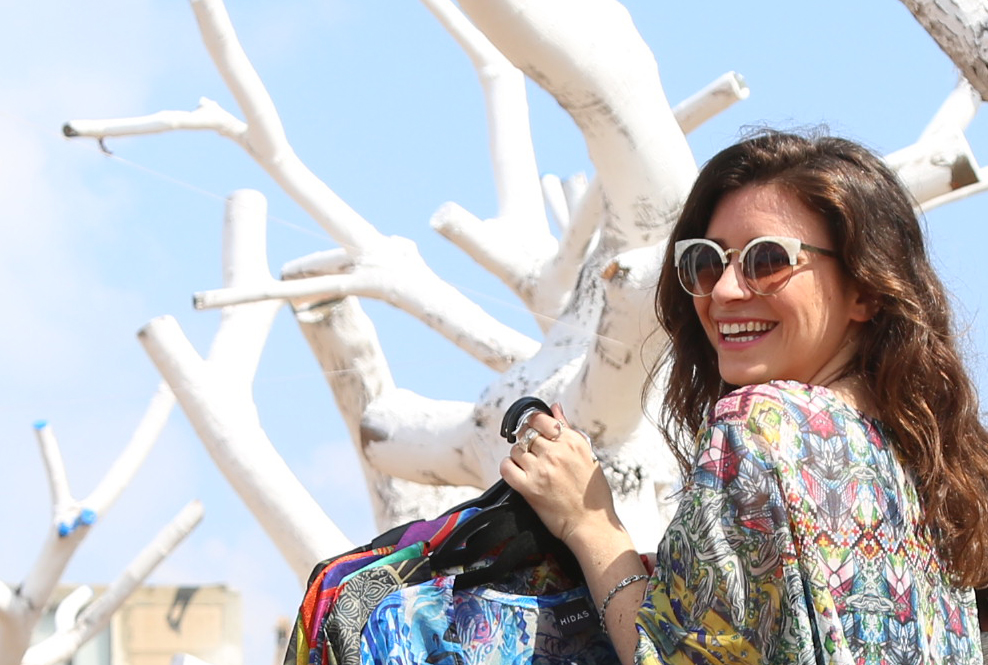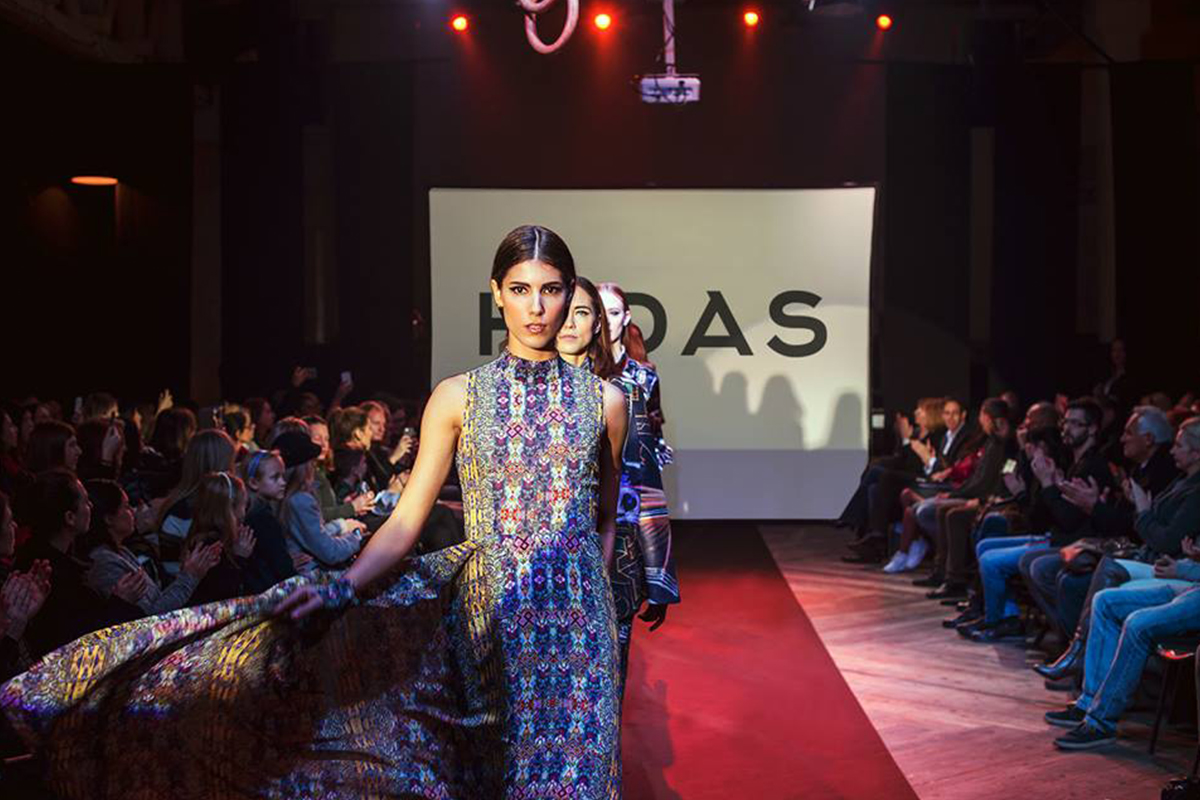When she was 3 years old, Michal Hidas “designed” her first outfit. She doesn’t actually remember this happening, but her mother tells the story of how little Michal gave her directions. “I was very assertively knowing what I want, telling her to cut here and cut there,” she told me, laughing.
This story is almost too on the nose, considering that Michal is now a prominent designer making waves in the global fashion world by redefining the role of ethical fashion and taking a stand for human rights. The Israeli-born Jewish designer, currently based in Germany, has always had a penchant for clothes and a feeling that what we wear on the outside can impact how we feel and behave in ways we don’t even realize. “If I want to feel better, I will wear something that makes me feel better. If I want to chill on the couch and do nothing today, I will wear something that makes it even more pleasurable.”

Michal spoke to me via Zoom from the office in her Munich apartment — “the longest I’ve ever been in one place, ever,” she grinned — where she has been hunkering down for the duration of the pandemic. She is soft spoken, wearing a bright, warm smile and a cozy-looking turtleneck sweatshirt of her own design. Despite looking extremely comfy at home, Michal has not been stagnant during 2020 — not at all. In fact, sitting still doesn’t seem to be an option for her. She has too much to do, sees too many problems that need fixing, meets too many people whose stories she feels pulled to tell.
For starters, Michal has been volunteering with refugees in the many encampments around Munich while designing a new line for her brand. Sometimes volunteering means cooking alongside Afghani, Iranian, and Syrian women or supporting a tech nonprofit that empowers disadvantaged folks by teaching critical digital skills. Other times it’s just listening to people who have found themselves exiled in a foreign land, trying to adapt while maintaining their cultural richness.
Michal is no stranger to creating unlikely alliances and envisioning a brighter, optimistic future. That can be seen in the new line from her brand, HÍDAS, which tells the tales of the people she has met, bringing personal stories of refugees to a global audience.
“My brand is a platform to communicate the messages that I care about,” she explains. “I am privileged because I was born in the right place at the right time and not five meters away from the border, and not 90 years before […] and I have this responsibility because people care about what I do. That’s why I can use it.”
In a way, Michal’s family legacy has positioned her to do exactly the job she’s doing. Her grandparents, who were born 90 years before her, were refugees. On her mother’s side, her grandfather came to Israel from the Czech Republic as a teen who had lost everything and everyone in the Holocaust. Her maternal grandmother was born in Tel Aviv to parents who had fled Europe pre-WWII, only to die as a result of the horrifying living conditions in the area when their daughter was a young child. From that point on, her maternal grandmother raised herself, helped along by an array of neighbors, all of whom came from different places around the world. As a result, her “culture” has always been an international hodgepodge of the traditions imparted to her by these neighbor-parents.
When her maternal grandparents met, they had nothing and no one. Two orphans trying to make their way in life, they started a shop in Bat-Yam selling khaki work pants and linens. Quickly, the shop grew, becoming the first major fashion provider in the country. They bought from local designers, uplifting the creative work of “old ladies sitting at home and sewing,” as Michal puts it. “They were the first ones to import fashion from Paris, places like that.” When she recalls the story of her grandfather voyaging for months at a time to New York to sketch the window designs on 5th Avenue, her eyes get misty and proud.
Many years later, Michal found herself impacted by the violent realities of war as well. Following her mandatory military service in the IDF, during which she served as a contact person for the families of soldiers who had been injured or killed in the line of duty, she enrolled in a basic design program and got a diploma. By this time, she knew that fashion was her calling, but wasn’t sure how she would use it to tell her story and voice her opinions about the injustices in the world. In 2012, she enrolled at the Istituto Marangoni in Milan to deepen her understanding of her chosen craft.
It wasn’t an easy time. She was surprised to encounter a great deal of antisemitism from her classmates. People refused to speak with her, sit near her, engage with her in any way. She felt isolated and unsure of how to move forward.
After her second year in Milan, Michal came home for the summer, only to be greeted by another war. Israeli ground forces had entered Gaza once again. Michal spent the summer volunteering with kids who were bussed out of the danger zones for a few days of calm. “These kids… if something will fall, they run away, they hide, and they cry […] because they used to have four seconds to run to the shelters, throughout all of their lives.” That’s when it dawned on her. “What I have no clue about is actually, how does it look on the other side? What is happening with the kids over there? It’s not even that I had a blurry picture of how Gaza looks like — I had nothing. All I know about is the war.”
She started sending messages to Gazans on Facebook. She wanted to understand, to listen, to learn. For months on end, no one was willing to speak with her. The only people who wrote back told her that she was a murderer. “Of course, I can’t judge them. They don’t know anything about me [besides] what the media wants them to know about me,” she explained.
Finally, someone wrote back and was open to talking. “We understood that we have a door to see the other side, to talk just like people about our dreams, our hopes, our families, the food we like, music […] and we became friends.” More than friends — they soon became collaborators. It turned out he was an architect, and he began sharing his sketches with Michal, who turned them into patterns that could be printed on fabric.
Gaza only has about four or six hours of electricity a day, usually from midnight to 4 a.m., so working together was a major challenge. So were the cultural differences. But ultimately, they realized that anything they made would be optimistic, colorful, whimsical, even naïve. “We don’t want to reunite again for death and for sorrow,” she explained. “We want to reunite for life, for art, for culture, for communication, for everything we believe in.”
Looking at the BRIDGING collection, which was launched in a small Jaffa gallery in 2015, this is very evident. Hand-drawn kaleidoscopic sketches created by her Palestinian partner (who can’t be named for security reasons) criss-cross up and down the luxurious fabrics. His signature is there, too, amongst the vivid designs.
It’s also clear why she was quickly whisked off to show the original HÍDAS collection across Europe, Asia, and North America, eventually premiering their second collection at New York Fashion Week in 2017, where Michal and her partner received the Fashion Humanitarian Award presented by Runway the Realway. The second BRIDGING collection was also shown at a 2019 Forbes “30 Under 30” event in Jerusalem.
These days, the two are working on bringing the voices, drawings, and words of Syrian refugees to the public eye. Michal is also looking at how to design fashion that is more inclusive for people with disabilities. “From now on, everything I’m working on is also suitable for both people with physical disabilities and without,” she said.
To her, inclusivity is the clear path forward. Fashion provides a way to improve self-esteem, to communicate, to create beauty in the darkness. Michal and her collaborator have dared not to wait for a more beautiful future, but to create one in the here and now.



